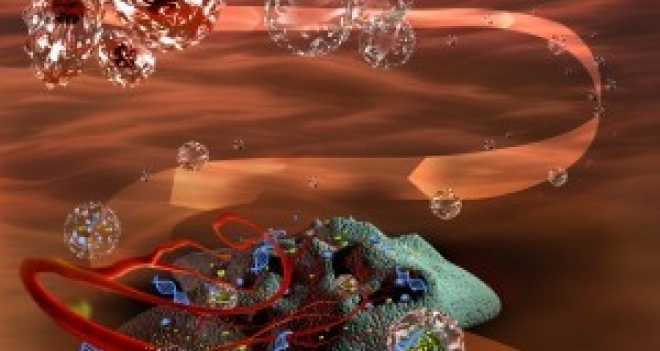Safe delivery of particles that leads to the production of the anti-cancer drug inside the target cell
In animal model experiments, the technology doubled life expectancy after the development of the disease
New technology for the delivery of targeted anti-cancer therapeutics in the body has been developed at the laboratory of Prof. Marcelle Machluf of the Technion.
This technology dramatically increases the therapy’s efficacy and prevents the side effects associated with existing chemotherapy. In animal model experiments, the system doubled life expectancy after the development of the prostate cancer.
Although treatment of symptoms is an important medical goal, the ultimate goal of medical practice is the eradication of the disease itself by treating its root causes. This is true, of course, for cancer medicine, which aims to eliminate the tumor and its metastases. Two problems in this area are the side effects of chemotherapy and the ability of cancer cells to develop resistance to these drugs.
The good news is that gene therapy, which has enjoyed a research and clinical boom in recent decades, has already proven to be effective in treating tumors and metastases. The tool of genetic therapy is the insertion of genes, i.e., nucleic acid sequences that are coded for the production of proteins. This tool enables one of two things: (a) the creation of proteins that replace damaged or missing proteins in the target cell, or (b) the insertion of genes leading to the creation of anti-cancer proteins in the target cell. This can prevent the development of resistance to chemotherapy and reduce the side effects caused by dispersion of the toxic load on its way to the tumor.
However, despite gene therapy’s great inherent potential for cancer therapy, its clinical application is still very limited. The widespread method in gene therapy – inserting genes into target cells using viruses – arouses a harsh response of the immune system in some cases. In addition, current treatments involve ‘seeping out’ of the drug on its way to the cancer target, resulting in damage to healthy tissue causing serious side effects.
An article published on February 24 in the journal Nano Letters heralds a breakthrough in the accurate delivery of genes to the target without the use of viruses. The new technology, developed at the laboratory of Prof. Marcelle Machluf of the Technion Faculty of Biotechnology and Food Engineering, is an innovative delivery platform called Nano-Ghost. The Nano-Ghosts are tiny particles made from the outer membrane of a certain type of cells, called Mesenchymal Stem Cells. These cells are able to selectively target various cancers.
With the technology developed by Prof. Machluf, together with doctoral student Limor Kaneti, these cells may be produced in large quantities in the laboratory, emptied of their contents and turned into empty packages – Nano-Ghosts. Specific genes are inserted into these packages and begin to produce an anti-cancer protein only upon reaching the tumor. Therefore they do not harm healthy tissue on their way to the target. Moreover, the anti-cancer protein affects not only the target cells into which the gene is inserted, but also the adjacent cancer cells and the blood vessels that support the tumor and are essential for its survival.
The clinical use of this technology is simple: after the genetic material is loaded, the Nano-Ghosts are injected directly into the bloodstream, through which they navigate to the tumor. Since outwardly these are mesenchymal stem cells, the system detects these particles as friendly and does not harm them; and since the particles do not release their cargo en route, they cannot harm healthy tissues. Only after they have reached the malignant tissue and homed in on it do they insert the gene into the tumor cells and initiate the production of the anti-cancer protein. It should be noted that since these particles do not generate any immune rejection, there is no need to produce the mesenchymal stem cells from the patient himself.
Animal model experiments have yielded very encouraging data: the new technology doubled the animal’s life expectancy after the development of prostate cancer, leading to a delay of over 75% in the development of prostate cancer, and of over 50% in the case of non-small cell lung carcinoma. No side effects and toxicity were observed in these animals, indicating the safety of the system.
Prof. Marcelle Machluf is a world-renowned researcher in the fields of drug delivery, gene therapy, cell therapy and tissue engineering. Her lab is developing and engineering nano systems and micro systems for the delivery of drugs and genes (as in the present study); encapsulation (“packing”) of cellular systems for treating cancer and diabetes; and the development of scaffolds for cardiac, vascular and pancreatic tissue engineering. Prof. Machluf has published over 60 articles and book chapters, and seven of her patents in the process of registration.
Link to the article: http://pubs.acs.org/doi/pdfplus/10.1021/acs.nanolett.5b04237




